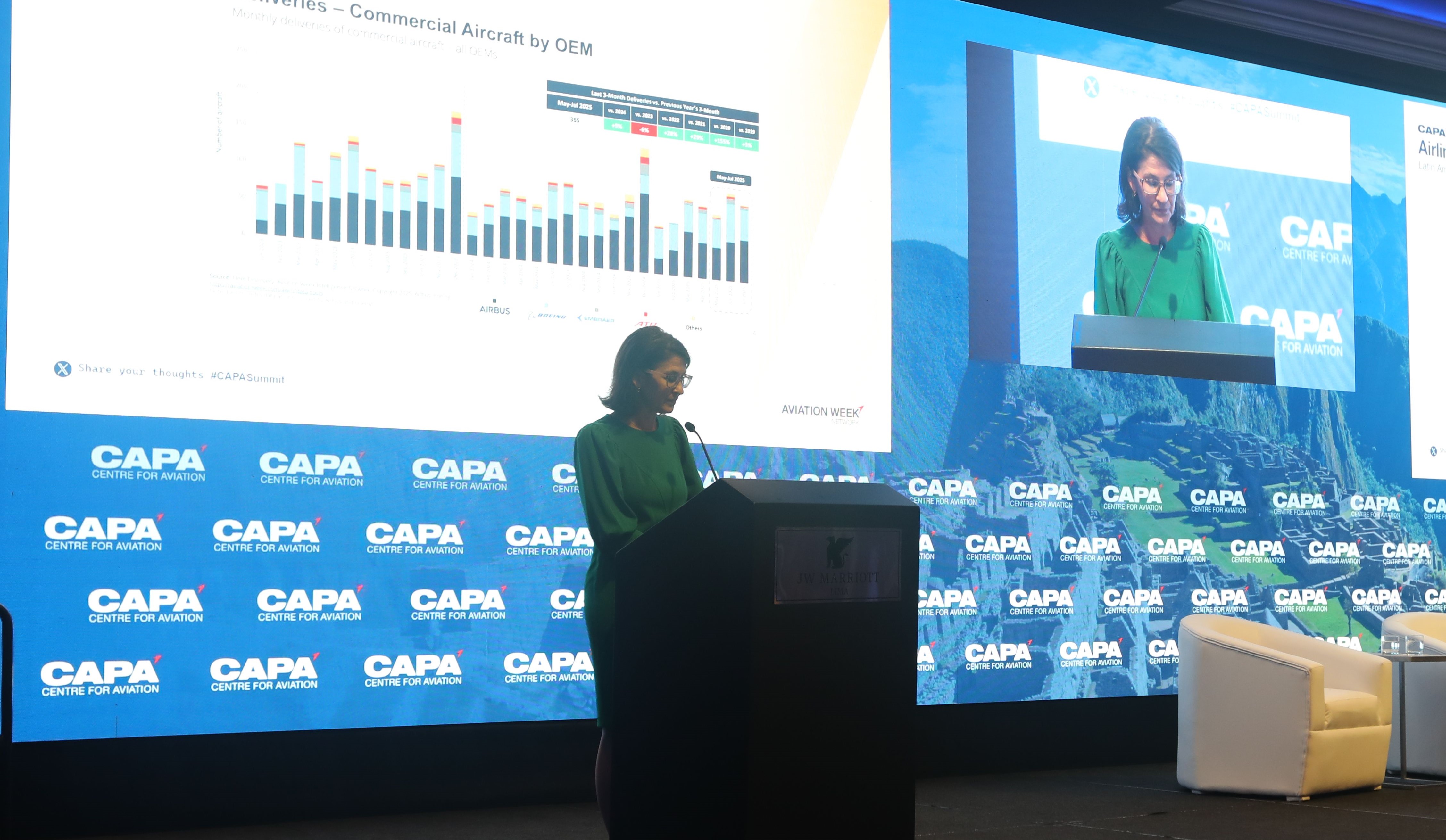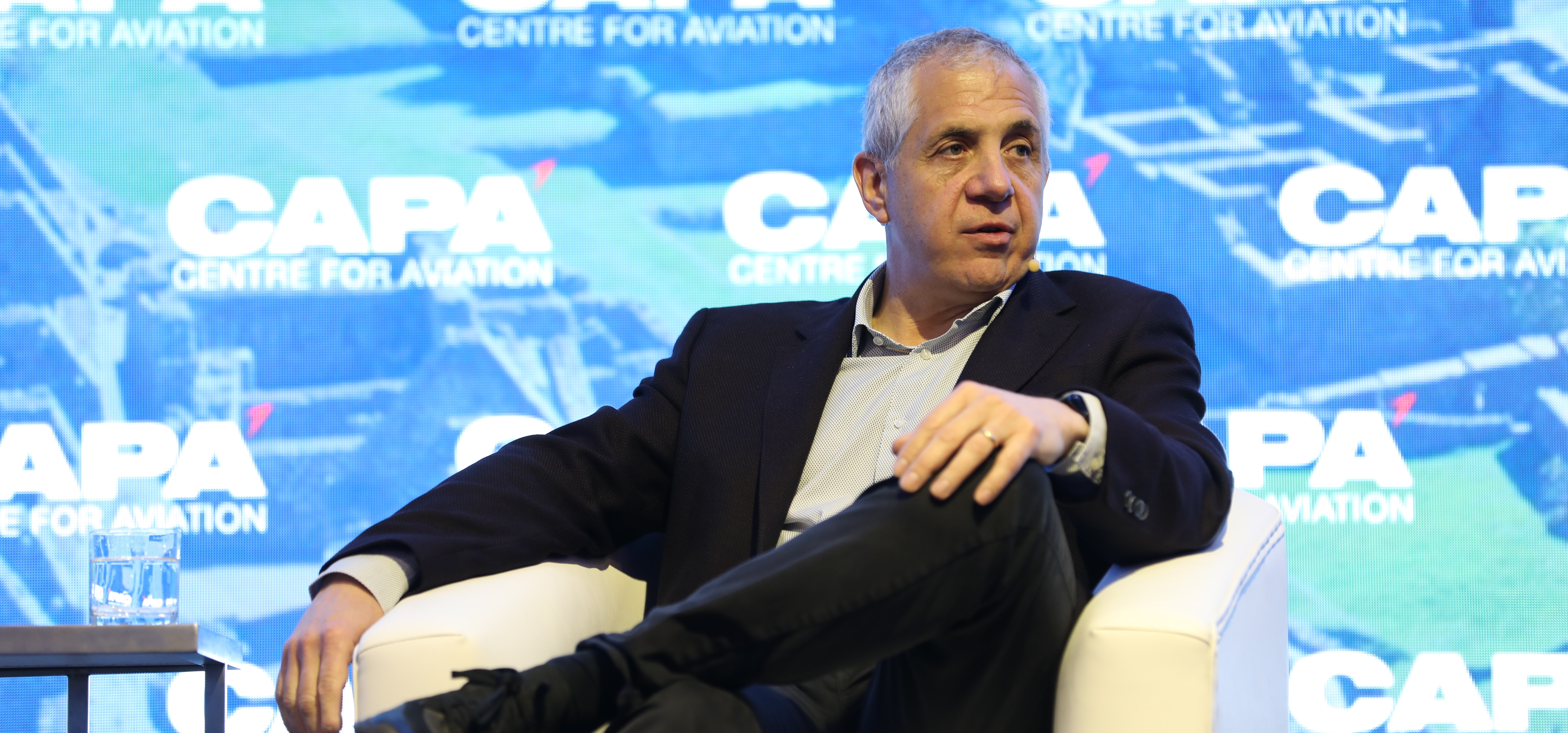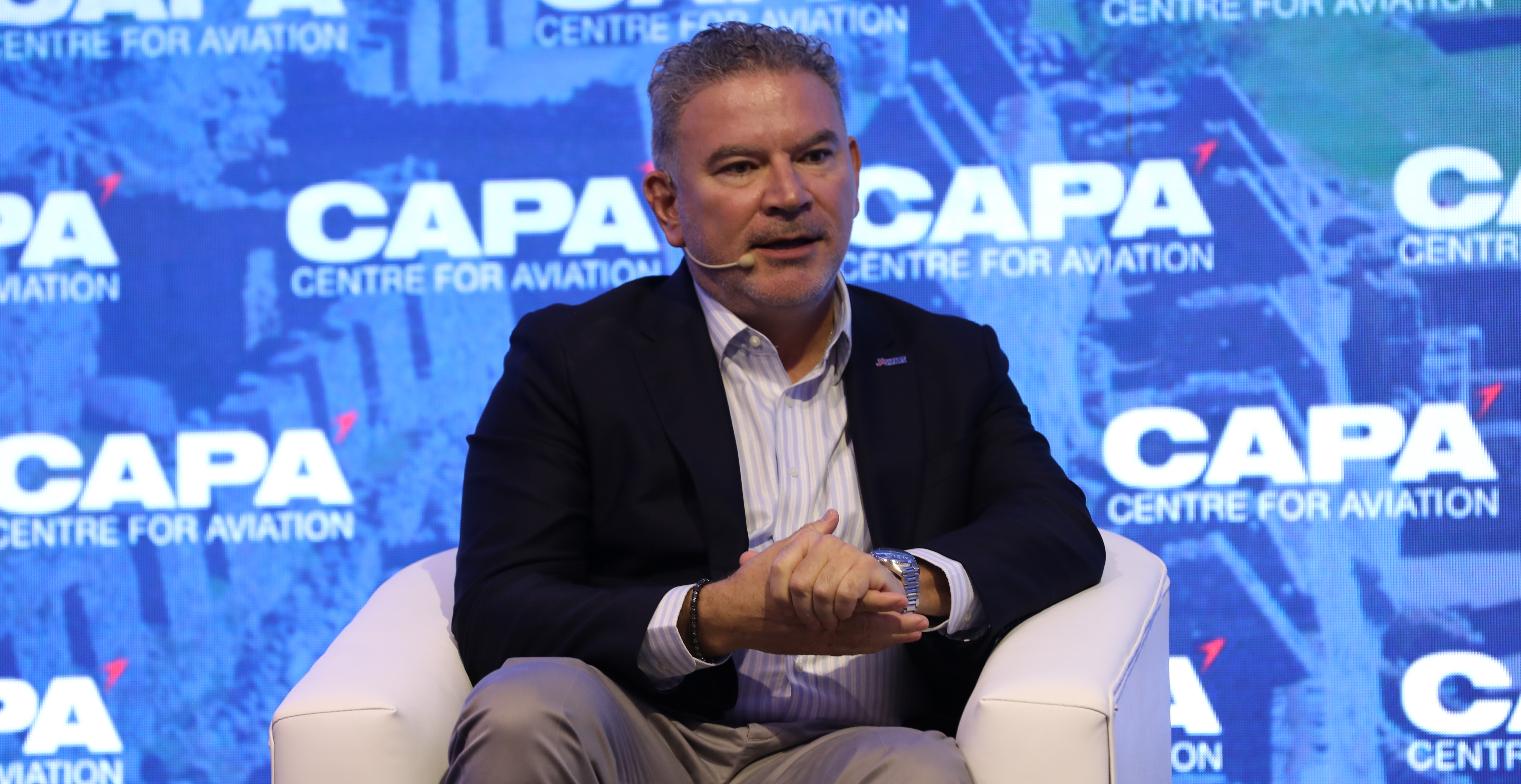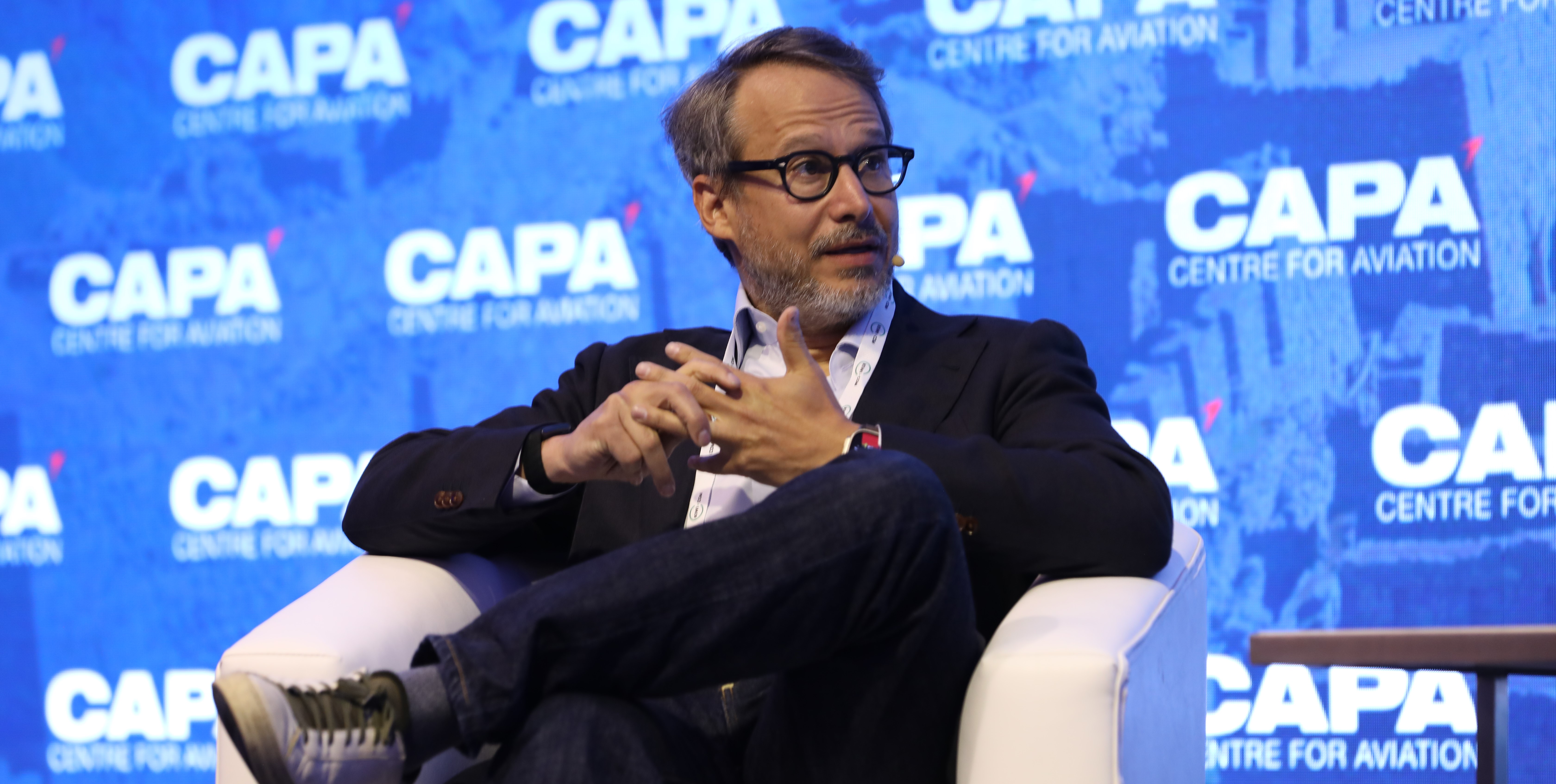CAPA Airline Leader Summit Latin America & Caribbean 2025: key Highlights summary

The CAPA Airline Leader Summit Latin America & Caribbean 2025 in Lima, Peru featured a stellar lineup of high-level speakers and panellists covering a wide range of critical industry topics.
These highlights cover a selection of the key insights from the packed agenda of in-depth interviews, keynote presentations and expert panel discussions.
For full coverage of the CAPA Airline Leader Summit Latin America & Caribbean and more, visit the CAPA - Centre for Aviation website or add the CAPA Events category to your custom news Alerts.
Summary
- Latin America's aviation sector is experiencing strong post-pandemic recovery, with aircraft utilisation up 24% since 2019 and significant new aircraft orders.
- Infrastructure and regulatory challenges, including high taxes and limited airport capacity, remain major barriers to growth and regional connectivity.
- Airlines are prioritising sustainability, with LATAM targeting carbon neutrality by 2050 and zero waste to landfill by 2027.
- Low-cost carriers, like JetSMART, are rapidly expanding, focusing on affordability and attracting first-time flyers in underserved markets.
- Strategic partnerships and consolidation, such as LATAM's joint venture with Delta Air Lines and Abra Group's integration efforts, are enhancing network reach and operational efficiency.
- Technological innovation, including AI and virtual interlining, is seen as key to improving passenger experience and addressing operational challenges in the region.
This summary was generated with AI assistance.
All content was verified for grammar before publication, CAPA - Centre for Aviation does not take responsibility for information captured by AI.
For full coverage of the CAPA Airline Leader Summit Latin America & Caribbean (LAAS), visit the CAPA - Centre for Aviation website or add the CAPA Events category to your custom news Alerts.
CAPA State of the Industry with CAPA - Centre for Aviation, Senior Analyst, Lori Ranson
In the 'CAPA State of the Industry' session at LAAS 2025, Lori Ranson delivered a comprehensive analysis of the aviation sector, focusing on Latin America's resilience, growth, and sustainability.
Aircraft utilisation in the region has surged by 24% since 2019, despite challenges such as engine-related groundings.
Canadian airlines, including Air Canada and WestJet, have expanded their presence in Latin America, with capacity deployment increasing by 13% year-on-year.
Smaller markets, like Puerto Escondido and Tepic, have gained traction, with United Airlines and American Airlines also launching new routes to these destinations.
CAPA - Centre for Aviation, Senior Analyst, Lori Ranson presenting at the CAPA Airline Leader Summit Latin America & Caribbean 2025

Source: CAPA - Centre for Aviation.
Latin America's aircraft orders are substantial, totalling 710, with narrowbody planes accounting for 80%., and 23 widebody aircraft on order (including for LATAM and AeroMexico).
Airbus and Boeing forecasts predict robust growth, such as Brazil's trips per capita doubling by 2044 and international arrivals increasing by 40% over the next decade.
Boeing's production rates for 737 MAX and 787 aircraft are improving, while Airbus aims to ramp up deliveries, despite supply chain challenges.
Embraer's gear turbofan advancements and delivery forecasts further underscore the industry's recovery.
Airline Leader interview: LATAM Airlines, Group CEO Roberto Alvo
LATAM Airlines Group, under CEO Roberto Alvo, has solidified its position as South America's leading airline, operating a fleet of 360 aircraft and planning 12 new deliveries in the second quarter of 2025.
LATAM's operational priorities - people, customers, environment, and numbers - drive its strategy, with sustainability at the forefront.
The airline aims for carbon neutrality by 2050 and zero waste to landfills by 2027, while exploring regional jets and leveraging fleet flexibility to address untapped market potential.
LATAM Airlines Group CEO Roberto Alvo speaking at the CAPA Airline Leader Summit Latin America & Caribbean 2025

Source: CAPA - Centre for Aviation.
The strategic partnership between LATAM and Delta Air Lines has flourished, with Delta's 20% stake enabling joint ventures that have grown capacity by 50% and market share by 10%.
This collaboration enhances connectivity between South America and the US - with new routes like Buenos Aires to Miami.
IATA forecasts USD1.1 billion in profits for Latin America in 2025, despite challenges such as weak currencies and taxation.
The session also highlighted the air freight market's stability, LATAM's cargo fleet challenges, and the industry's broader sustainability efforts.
Overall, the discussion underscored Latin America's adaptability, growth potential, and commitment to a sustainable future.
Navigating turbulence: strategic priorities for airline leadership in the Americas
Moderated by HEICO's Senior VP Government & Industry Affairs, Alex de Gunten, the panel featured Arajet, COO, Garret Malone; LATAM Airlines Peru, CEO, Manuel van Oordt; JetSMART, CEO, Estuardo Ortíz; and SKY Peru, CEO, Jose Raul Vargas; who discussed infrastructure, labour shortages, government policies, and the future of aviation.
ALTA provided key statistics, revealing that 75% of international passengers travel outside Latin America, while intra-Latin American traffic remains ten times smaller than intra-European traffic. With only 0.6 flights per capita annually, and 80% of the population never having flown, the region's untapped potential is immense.
Infrastructure emerged as a critical issue, with Jose Raul Vargas highlighting limitations in Peru's regional airports, including restricted operating hours and inadequate capacity.
Manuel van Oordt noted that while passenger traffic has grown sevenfold in Peru over 25 years, the infrastructure has lagged, creating inefficiencies. Jet bridges at Lima's new airport remain underutilised, further complicating operations.
Labour shortages were another pressing concern, with Mr Malone (Arajet) emphasising the need for 37,000 pilots and 42,000 technicians in Latin America over the next two decades. He shared his 'My First Flight' programme, which introduces disadvantaged children to aviation, aiming to inspire future talent.
Airlines are also promoting gender equality, with LATAM Airlines Peru offering scholarships to attract women to maintenance roles. Jose Raul Vargas highlighted his airline's training school, which develops technical skills and instils company culture.
Navigating turbulence: strategic priorities for Airline leadership in the Americas panel at the CAPA Airline Leader Summit Latin America & Caribbean 2025

Source: CAPA - Centre for Aviation.
AI was discussed as a transformative tool for optimising operations, reducing costs, and enhancing passenger experiences.
Personal anecdotes added depth to the session, with Mr Ortiz sharing his love for trail running and bartending, Mr Malone discussing scuba diving, and Mr van Oordt reflecting on his years as a DJ.
Government policies and airport fees were identified as barriers to growth. Estuardo Ortiz argued that high fees stifle traffic, and suggested volume-based strategies to stimulate tourism.
Manuel van Oordt criticised plans to tax transfer passengers in Peru, which could deter travellers.
The threat of a 26% VAT in Brazil was also discussed, with panellists warning of its potential to shrink the industry.
Successful collaboration models were highlighted, including Panama's unified approach to aviation and tourism, and Ecuador's strategy to reduce taxation and promote travel. These examples demonstrate the benefits of aligning stakeholders toward common goals.
The session concluded with reflections on attracting the next generation to aviation, with panellists recommending roles such as pilots, cabin crew, and digital specialists as exciting career paths.
Airline Leader interview: JetSMART CEO Estuardo Ortíz
Estuardo Ortiz, CEO of JetSMART, shared the airline's remarkable journey during the session, hosted by John Strickland.
Mr Ortiz discussed his transition from consumer goods to aviation, driven by his passion for travel and supported by Indigo Partners, whose experience with Wizz Air in Europe informed JetSMART's low-cost model.
He highlighted JetSMART's operations across Chile, Argentina, Peru, and Colombia, emphasising its focus on non-flyers and price sensitive customers.
Despite challenges like restrictive regulations, the COVID-19 pandemic, and Pratt & Whitney GTF engine issues, JetSMART grew its fleet from 17 to 49 aircraft, with plans to reach 100 by 2031.
Mr Ortiz detailed the airline's strategic response to COVID-19, which included entering new markets and restructuring operations to enhance efficiency.
He also discussed JetSMART's partnership with American Airlines, offering code-sharing benefits and 'Advantage' miles, and addressed regulatory debates about baggage inclusion in fares, advocating for customer choice.
JetSMART CEO Estuardo Ortíz speaking at the CAPA Airline Leader Summit Latin America & Caribbean 2025

Source: CAPA - Centre for Aviation.
Recognised as South America's best low-cost airline by Skytrax, JetSMART achieved milestones, such as serving 50 million passengers and operating 50 destinations.
Mr Ortiz emphasised the importance of political support for low-cost models in South America, noting progress, but underscoring ongoing challenges.
JetSMART's rapid growth in 2025 reflects its commitment to affordability, reliability, and customer satisfaction, while navigating regulatory and operational hurdles.
The session underscored JetSMART's vision for transforming air travel in South America through innovation, resilience, and strategic partnerships.
Growing intra-regional travel in the face of shifting travel preferences
The session featured LATAM's VP Network & Strategy, Kamal Hadad; IATA Regional VP Americas/ALTA CEO, Peter Cerdá; SKY Airline's Planning, Network and Strategy VP, Pedro Navarro; and JetSMART's CCO, Victor Mejia, who explored the transformative trends shaping Latin America's aviation landscape.
With a population nearing 700 million, that region is experiencing a surge in travel demand, fuelled by liberalisation policies, such as Argentina's open skies agreements. These measures have enabled airlines like JetSMART to expand operations, with Victor Meija reporting a 100% increase in domestic capacity and 40% growth internationally.
Panellists highlighted the success of liberalisation in countries like the Dominican Republic and Ecuador - contrasting them with protectionist nations such as Cuba and Venezuela, where connectivity struggles.
Seasonal travel trends were discussed, with Mr Cerdá predicting increased secondary city connectivity during North America's winter, enabled by advanced aircraft like the Boeing 737 MAX and Airbus A321XLR.
Infrastructure challenges remain a pressing issue, particularly for secondary airports, which often lack navigation aids, customs personnel, and adequate facilities. Kamal Hadad emphasised the need for government involvement in airport planning, citing delays in projects like Cusco's Chicheros Airport and the new Lima terminal as examples of sub-optimal planning.
Growing intra-regional travel in the face of shifting travel preferences panel at the CAPA Airline Leader Summit Latin America & Caribbean 2025

Source: CAPA - Centre for Aviation.
Taxation emerged as a critical factor affecting affordability, with Mr Cerdá noting the competitive pressure from bus transportation, which remains a dominant mode of travel due to its lower costs.
Passenger mix trends revealed a growing segment of corporate travellers, accounting for 10% of inter-regional traffic, alongside an increasing number of first-time flyers.
Panellists agreed that convenience, reliability, and affordability are key to attracting more passengers, particularly in secondary markets.
Virtual interlining technology was identified as a promising solution to enhance connectivity, with Mr Hadad expressing interest in its potential applications.
The session also delved into the role of AI in reimagining airline retailing, as presented by Inspired Solutions. AI-driven platforms are transforming the travel experience by integrating data, analytics, and personalisation to improve customer satisfaction. These innovations, combined with coordinated efforts between airlines, airports, and governments, are essential to addressing infrastructure gaps and ensuring sustainable growth.
Panellists expressed optimism about the region's future, citing the expected addition of 218 million new passengers over the next 15 years as a testament to its untapped potential.
However, they cautioned that achieving this growth requires strategic planning, investment in secondary airports, and a commitment to affordability and accessibility for all travellers.
Regional regulatory approaches, taxation and economic balance
Speakers: BermudAir's Founder & CEO, Adam Scott; ALTA/IATA CEO/Regional VP, Peter Cerda; Asociación de Empresas de Transporte Aéreo Internacional - AETAI, General Manager, Carlos Gutiérrez; and Arajet, COO, Garret Malone discussed the burden of Air Operator Certificates (AOCs) in South America, which elevate costs and necessitate strategic alliances like code share agreements, interline arrangements, and mergers.
Caribbean airline partnerships were highlighted as essential for enhancing connectivity and fostering economic growth.
The industry's consolidation reflects its drive for efficiency amid regional complexities.
Taxation emerged as a critical issue, with Mr Scott condemning high taxes in Bermuda and Latin America as structural barriers to growth - he emphasised the suffocating impact of these taxes on aviation and urged governments to lower them to unlock the sector's economic benefits.
Mr Scott contrasted the cruise industry's limited economic contribution, noting that cruise passengers often spend minimally compared to airline visitors, who significantly boost local economies.
Regional regulatory approaches, taxation and economic balance panel at the CAPA Airline Leader Summit Latin America & Caribbean 2025

Source: CAPA - Centre for Aviation.
The speakers underscored the importance of demonstrating aviation's value to communities, advocating for policies that support its natural growth.
A proposal to write a 'Substack' article on Latin American taxation aimed to encourage reforms that stimulate regional travel.
The session offered rich insights into aviation's role in economic development.
Airline Leader interview: Abra Group CEO Adrian Neuhauser
Adrian Neuhauser, CEO of Abra Group, provided a comprehensive overview of the company's consolidation strategy and vision for Latin American aviation during a session moderated by John Strickland.
Abra Group, which integrates airlines like Avianca and Wamos Air, focuses on preserving brand identities while achieving operational synergies. Avianca, one of the world's oldest airlines, plays a pivotal role in connecting Latin America to North America and Europe, complemented by Wamos Air's trans Atlantic capacity.
Mr Neuhauser emphasised the importance of network integration, commercial strategy alignment, and frequent flyer programme consolidation to enhance customer experiences and operational efficiency.
The session delved into Air Europa's consolidation route with Turkish Airlines, contrasting it with Abra Group's approach.
Mr Neuhauser reflected on the failure of Viva Air and other small airlines in Latin America, highlighting the need for rational competition and regulatory support to prevent market instability. He argued that consolidation could safeguard jobs, improve service quality, and stabilise the industry.
Abra Group's strategic relationships with OEMs like Boeing, Airbus, and Rolls Royce were discussed, showcasing its ability to operate diverse fleets efficiently. Mr Neuhauser mentioned the recent Airbus A350 order, complementing Boeing 787s, and addressed the operational challenges of Bogotá's high-altitude airport.
He also touched on Gol's successful Chapter 11 recovery and Azul's ongoing restructuring, noting the potential for future consolidation.
Abra Group CEO Adrian Neuhauser speaking at the CAPA Airline Leader Summit Latin America & Caribbean 2025

Source: CAPA - Centre for Aviation.
Mr Neuhauser expressed interest in integrating SKY Airline into Abra Group, citing its complementary market and strategy.
He outlined the group's focus on adapting to premium leisure travel's growth in Latin America, rolling out business class offerings across 80% of Avianca's network.
The conversation also covered collaboration with airports and governments to address high ticket taxes and cost escalations, which impact affordability and accessibility.
The session concluded with Mr Neuhauser's reflections on the evolving dynamics of Latin American aviation, emphasising the importance of balancing cost efficiency with service quality to meet diverse customer needs.
Abra Group's own strategic vision aims to drive connectivity within Latin America and between the region and the world, ensuring sustainable growth and enhanced travel experiences.


